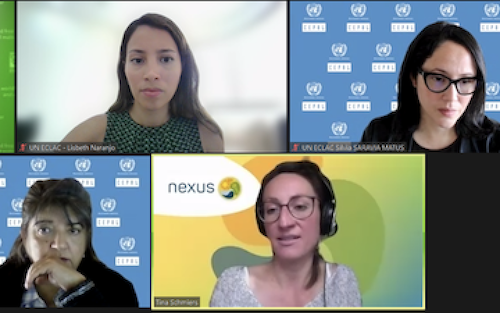ECLAC’s participation in the seminar on cross-border and sectoral cooperation with a focus on regional experiences of the institutionalization and governance of the Water-Energy-Food Nexus
Work area(s)
Topic(s)
Teaser
The virtual event, organized by FAO, saw the participation of the Water and Energy Unit of ECLAC by presenting the methodological guide for the design of actions with a Nexus approach and lessons learned in national and transboundary contexts.
Event information

Date
19 Oct 2021, 06:00 - 07:30Event type
On Tuesday, October 19th, the second session of the 2nd round of webinars on solutions of the Nexus between water, energy and food took place, focused on the governance of the Nexus: “Transboundary and sectoral cooperation”, an event organized by FAO in cooperation with Water Energy Food Nexus in Africa (WEF Nexus), Water and Energy for Food (WE4F), GIZ Nexus Dialogues and the Stockholm Environment Institute (SEI). The session provided an insight on the successful integration of the Nexus approach between water, energy and food security in governance structures and presented different strategies for cross-border cooperation and governance of the Nexus from three regions: South Africa, Latin America and the Caribbean, and the Niger Basin.
Mrs Maria Ana Rodríguez, Head of the GIZ Nexus Project, opened the seminar. Subsequently, Mr Didier Zinsou, Director of the Niger Basin Authority, introduced the Nexus approach between water, energy and food in a cross-border context. The seminar featured the participation of Shamiso Kumbirai from Global Water Partnership Southern Africa (GWPSA) and her presentation on the governance framework of the Water-Energy-Food Nexus developed by the Southern African Development Community.
On behalf of ECLAC, Mrs Silvia Saravia Matus, economic affairs officer of the Water and Energy Unit of the Natural Resources Division, shared the ECLAC vision in promoting the Nexus approach in the LAC region and highlighted the importance of Nexus actions, the underlying challenges, and how to tackle them. She mentioned that many sectoral policies are generally uncoordinated or have incompatible objectives, which leads to low impact and duplication of efforts and resources.
Subsequently, Ms Lisbeth Naranjo, Consultant of the Water and Energy Unit of the Natural Resources Division of ECLAC, presented the Methodological Guide, a tool developed by ECLAC, and its two fundamental objectives. She highlighted that the Methodological Guide strengthens institutional capacities by constituting a collection of methodologies adapted to the availability of resources, making it more pragmatic and easy to understand. In addition, she indicated the characteristics of the guide, as well as the focus of the policy or project cycle, the four phases in which the guide is oriented: 1) diagnosis, 2) formulation, 3) planning and implementation and 4) monitoring and evaluation, highlighting its cyclical evaluation.
Finally, Mrs Saravia Matus summarized the lessons learned, highlighting eight challenges at the local and national levels, which are highly relevant at the cross-border level. The need to 1) promote dialogue and the participation of all key stakeholders 2) reinforce joint analysis of the causes that generate problems 3) define objectives with concrete goals and an intersectoral scope 4) evaluate and prioritize alternatives 5) an integrated, coherent and adaptive planning, 6) promote coordination instances 7) strengthen financial planning and leadership, and lastly, 8) monitoring and follow-up to action.
The presentation of the 19th of October: https://drive.google.com/file/d/1_CDuJ8K25iLBSjcIskq9VNHwqmbQRDS5/view?usp=sharing